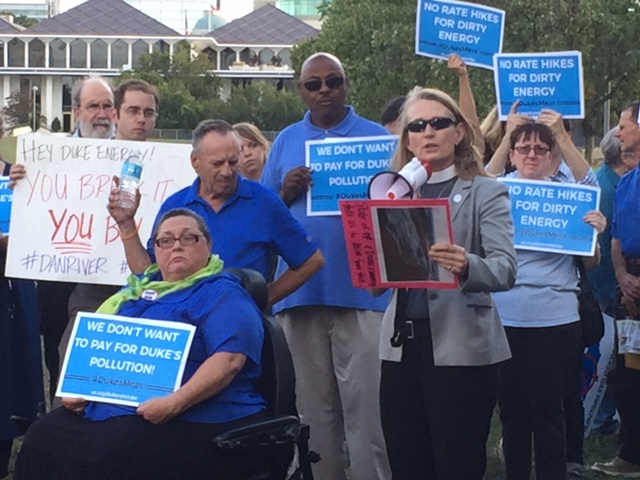Remarks offered at the Duke Energy Progress Rate Increase hearing on Monday, September 25.
Right now I have the privilege or the pain of owning two houses in Durham, NC. I hope to own only one in the near future, but for now this is my reality. Both houses help support the corporate earnings of Duke Energy Progress, which also helps support my retirement dreams because part of my Roth IRA is invested in Duke stock. Now you have my full disclosure, which I hope also demonstrates that my words do not come from a place of dislocated disinterest. I am keenly interested in the price of electricity because I pay those bills AND I derive benefit from their earnings.
Just as importantly, however, I am interested in a fair energy plan for all of Duke’s customers. Back to my two houses. One house uses so little electricity that Duke sent me a letter this summer asking if I’d like to have the power turned off—to go offline. No, I would not like to go offline because I do go over there periodically and turn on the lights. Every once in a while, I plug in a saw or a drill and work on the house.
I do understand the need to pay for the basic service even when I’m not using electricity. But I don’t understand why the basic service needs to go up 75%, unless maybe my Roth earnings are going up 75%. But they’re not, nor—truth be told—would I want them to. I never want to earn money from my salary or my retirement account that takes advantage of those who can least afford it.
The Christian scriptures that guide my decision making have plenty to say about those with might and money taking advantage of those without that social capital. It’s far more nuanced than a simply commodities exchange; it also includes extracting wealth from places that are fundamental to our lives—water, land, and labor.
- We steal the value of water when we make it undrinkable.
- We exploit the land by coopting it for the benefit of the few.
- We gain at the expense of the poor by imposing rate hikes that fall disproportionately on them.
And for my part as the leader of an organization that includes over six thousand congregations, it’s now going to cost more for these churches to keep the lights on. I’d rather churches have lower power bills and higher mission funding, especially if they’re focused on justice advocacy or maybe doing a little hurricane relief work.
Justice should determine our decisions, not economics. Is this rate hike just or is it just economics? Who stands to gain? Who will lose? After we answer those questions we can answer the question about a rate increase.

